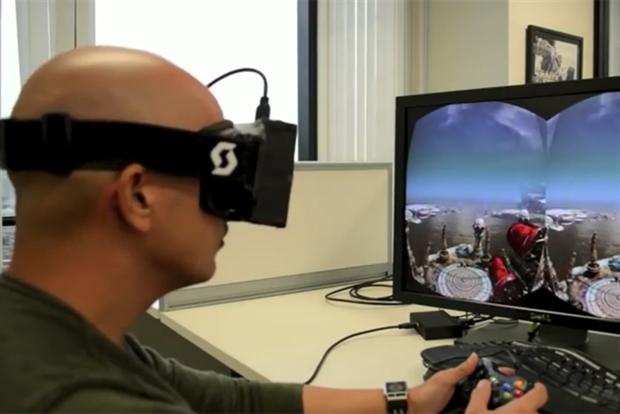And whilst there may have been some consistent logic in Zuckerberg’s aggressive purchase of WhatsApp in the sense of simply owning all major conversational platforms, the question of where exactly a virtual reality hardware manufacturer fits into Facebook’s world is rather harder to answer.
However, this is a question that cuts both ways. Let’s start by looking at Oculus Rift – apart from immediate wads of cash and infrastructure, what does it have to gain?
The story of Oculus
My guess is something like this. Oculus started life on Kickstarter, where its stratospheric success doubled as both a seed round and as proof of concept. That money, predictably, came mainly from gamers for whom Oculus was the future – virtual reality (VR) has long been tightly tied to gaming.
Oculus quickly became the obvious leader in the field, attracting gaming luminaries such as John Carmack and Gabe Newell. But Oculus also has a big problem in that they are a hardware manufacturer who would be overwhelmingly reliant on both developers making good software, and hardcore PC gamers spending a lot of money on their product as opposed to the inevitable competition of Sony, Nintendo and Microsoft.
Recently, however, Oculus has been very publicly dabbling in what can be described as ‘experiential’ – the best example being their Game of Thrones simulation at SXSW. So their ambitions are clearly being expanded, probably in no little part thanks to interested parties saying "wouldn’t it be cool if…?" Kind of like GoPro.
Enter Facebook
It’s difficult at first to imagine how Zuckerberg & co. could fold VR tech into their platform, but I think this is chiefly because we are thinking about how the platform is right now. Really, we should be thinking five years hence. I said of WhatsApp that Facebook "wants to own every mode of one-to-one conversation going – be it photo, video or text"; perhaps ‘virtual’ is just another mode.
For starters, Facebook have been far more explicit about their rationale for acquisition this time around: "Facebook plans to extend Oculus' existing advantage in gaming to new verticals […] virtual reality technology is a strong candidate to emerge as the next social and communications platform."
Starting something new
In this respect, I wonder if the best way to think about Oculus isn’t to actually frame it as a defensive move against the likes of Google Glass (hardware), Skype (software) or Twitter Amplify (media platform). In short, the use case I think Facebook probably has in mind is not tied to assets like their News Feed. It’s about creating an entirely new platform – a place for interaction.
As to what form that interaction takes, it’s safe to assume that the most obvious immediate use is being ‘in the room’ – at a party, lecture, conference and so on. There are easy wins here: be on stage with your favourite band, or travel to the World Cup final. Will virtual space rights be part and parcel of future sponsorship deals, I wonder?
I should think, though, that this fairly primitive approach will quickly expand (thanks to a ready-made industry of creating convincing computerised environments) to being ‘in the place’ – custom, virtual spaces that are not simply live-feeds of an event happening elsewhere. This is where marketing opportunities will start to appear.
So for instance, you’re a theme park. Build a virtual scale model of your park with all the moving parts, and let people poke around and plan their days from a bird’s-eye view. Or perhaps you’re a retailer – what about something like Thread.com adopting a virtual personal shopping experience, or creating VR ‘apps’ that show full-size previews of their clothes? Imagine how useful it would be for a furniture retailer to be able to preview what that chest of drawers would look like, or whether that kingsize bed would actually fit into the room. Perhaps we could join the next Felix Baumgartner on the edge of space.
Facebook see themselves as a facilitator of communication; your passport to the internet. The Oculus buy is a bet on human experience, and on our desire to share particular experiences in as high fidelity as possible.
This is certainly the biggest integration challenge Facebook has seen for a while in that it is hardware, and how they productize that outside of its standalone offering is going to be a difficult conversation. On the whole, though, Facebook has done well at protecting the assets it has acquired. This may just be the key for Oculus to not only make good on its initial promise, but to be part of something much, much bigger.
Phillip Dyte is paid social media manager at iProspect


